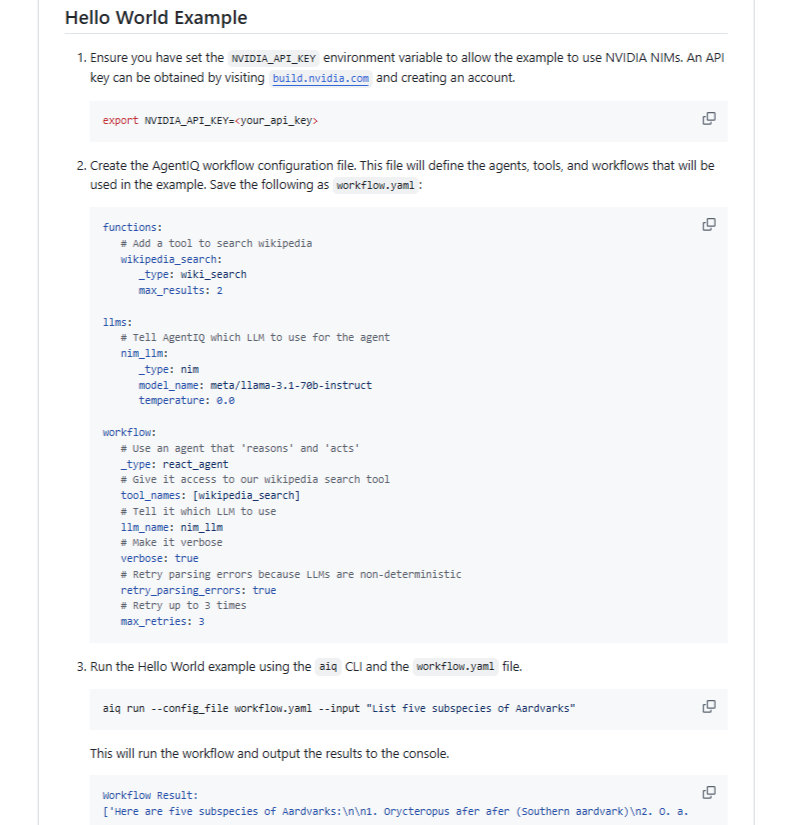Enterprises increasingly adopt agentic frameworks to build intelligent systems capable of performing complex tasks by chaining tools, models, and memory components. However, as organizations build these systems across multiple frameworks, challenges arise regarding interoperability, observability, performance profiling, and workflow evaluation. Teams are often locked into particular frameworks, making it hard to scale or reuse agents and tools across different contexts. Also, debugging agentic workflows or identifying inefficiencies becomes arduous without unified profiling and evaluation tools. The lack of a standardized way to build and monitor these systems creates a significant bottleneck in agile AI development and deployment.
NVIDIA has introduced AgentIQ, a lightweight and flexible Python library designed to unify agentic workflows across frameworks, memory systems, and data sources. Instead of replacing existing tools, AgentIQ enhances them, bringing composability, observability, and reusability to the forefront of AI system design. With AgentIQ, every agent, tool, and workflow is treated as a function call, allowing developers to mix and match components from different frameworks with minimal overhead. The release aims to streamline development, enabling detailed profiling and end-to-end evaluation across agentic systems.
AgentIQ is packed with features that make it a compelling solution for developers and enterprises building complex agentic systems:
- Framework Agnostic Design: AgentIQ integrates seamlessly with any agentic framework, such as LangChain, Llama Index, Crew.ai, Microsoft Semantic Kernel, and custom Python agents. This allows teams to continue using their current tools without replatforming.
- Reusability and Composability: Every component, whether an agent, a tool, or a workflow, is treated like a function call that can be reused, repurposed, and combined in different configurations.
- Rapid Development: Developers can start with prebuilt components and customize workflows quickly, saving time in system design and experimentation.
- Profiling and Bottleneck Detection: The built-in profiler allows detailed tracking of token usage, response timings, and hidden latencies at a granular level, helping teams optimize system performance.
- Observability Integration: AgentIQ works with any OpenTelemetry-compatible observability platform, allowing deep insights into how each part of the workflow functions.
- Evaluation System: A consistent and robust evaluation mechanism helps teams validate and maintain the accuracy of both Retrieval-Augmented Generation (RAG) and end-to-end (E2E) workflows.
- User Interface: AgentIQ includes a chat-based UI for real-time agent interaction, output visualization, and workflow debugging.
- MCP Compatibility: AgentIQ supports the Model Context Protocol (MCP), making incorporating tools hosted on MCP servers into function calls easier.
AgentIQ is best described as a complement to existing frameworks rather than a competitor. It does not aim to be another agentic framework, nor does it try to solve agent-to-agent communication; this remains the domain of protocols like HTTP and gRPC. AgentIQ also refrains from replacing observability platforms; instead, it provides the hooks and telemetry data that can be routed into whichever monitoring system the team prefers. It uniquely connects and profiles multi-agent workflows, even when deeply nested, using a function-call-based architecture. It combines agents and tools developed in different ecosystems and enables robust evaluation and monitoring from a centralized perspective. AgentIQ is also fully opt-in; users can integrate it at any level, whether at the tool, agent, or entire workflow level, depending on their needs.
AgentIQ’s design opens the door to multiple enterprise use cases. For example, a customer support system built using LangChain and custom Python agents can now integrate seamlessly with analytics tools running in Llama Index or Semantic Kernel. Developers can run profiling to identify which agent or tool in the workflow is causing a bottleneck or using too many tokens and evaluate the system’s response consistency and relevance over time. Installing AgentIQ is straightforward. It supports Ubuntu and other Linux-based distributions, including WSL, and uses modern Python environment management tools. After cloning the GitHub repository, users initialize submodules, install Git LFS for dataset handling, and create a virtual environment with `uv`. Developers can then install the full AgentIQ library and plugins using `uv sync –all-groups –all-extras` or opt for core installation with `uv sync`. Plugins like `langchain` or `profiling` can be installed as needed. The installation is verified using the `aiq –help` and `aiq –version` commands.
In conclusion, AgentIQ represents a significant step toward modular, interoperable, and observable agentic systems. Functioning as a unifying layer across frameworks and data sources empowers development teams to build sophisticated AI applications without worrying about compatibility, performance bottlenecks, or evaluation inconsistencies. Its profiling capabilities, evaluation system, and support for popular frameworks make it a critical tool in the AI developer’s arsenal. Also, AgentIQ’s opt-in approach ensures teams can start small, perhaps profiling just one tool or agent, and scale up as they see value. With future updates on the roadmap, including NeMo Guardrails integration, agentic accelerations in partnership with Dynamo, and a data feedback loop, AgentIQ is poised to become a foundational layer in enterprise agent development. For any team aiming to build, monitor, and optimize AI-driven workflows at scale, AgentIQ is the bridge that connects ideas to efficient execution.
Check out the GitHub Page. All credit for this research goes to the researchers of this project. Also, feel free to follow us on Twitter and don’t forget to join our 85k+ ML SubReddit.
The post NVIDIA AI Released AgentIQ: An Open-Source Library for Efficiently Connecting and Optimizing Teams of AI Agents appeared first on MarkTechPost.
Source: Read MoreÂ

 [Register Now] miniCON Virtual Conference on OPEN SOURCE AI: FREE REGISTRATION + Certificate of Attendance + 3 Hour Short Event (April 12, 9 am- 12 pm PST) + Hands on Workshop [Sponsored]
[Register Now] miniCON Virtual Conference on OPEN SOURCE AI: FREE REGISTRATION + Certificate of Attendance + 3 Hour Short Event (April 12, 9 am- 12 pm PST) + Hands on Workshop [Sponsored]
